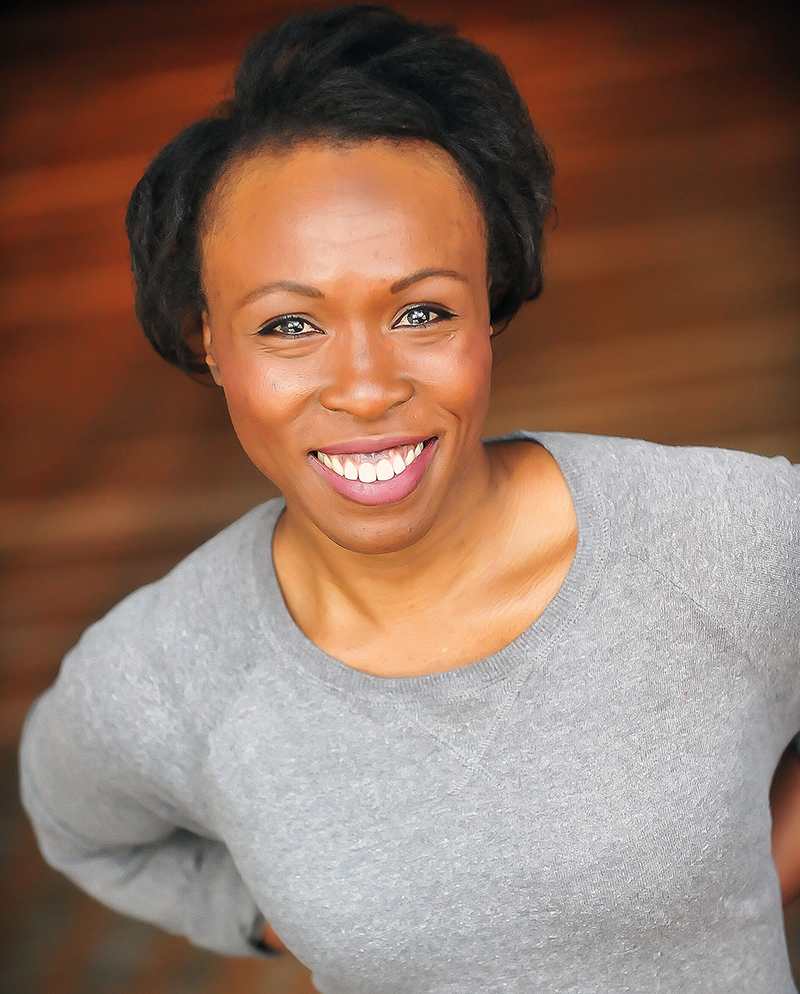Presented by Equity Bank

What a life the actor’s career can be, with a range of roles, costumes, and personas that challenge and stretch a performer’s range from young/old, male/female, good/bad, and everything in between.
With a B.F.A. from Stephens College and an M.F.A. from UMKC, Chioma Anyanwu has gained voice and acting chops in a wide variety of projects, from the Heart of America Shakespeare Festival to Godspell at Starlight. She has taught theater and directed productions at Avila.
Last year, Anyanwu played Mrs. Cratchit in KCRep’s beloved A Christmas Carol. The Charles Dickens classic, written in 1843, features the miserly Ebenezer Scrooge. Through visits from three ghosts—Christmas Past, Christmas Present, and Christmas Yet to Come—Scrooge has a chance at redemption. But will he take it?
He will if The Ghost of Christmas Past, Anyanwu’s role this year, has anything to say about it.
It’s a pivotal—and universal—part, as the Ghost begins to break through Scrooge’s iron shell, reminding him of the importance of love, friendship, and laughter.
A Christmas Carol runs from Nov. 21- Dec. 24 at Spencer Theatre, PAC Center, on the UMKC campus. For tickets and a chance to sit in the Glitter Row for an up-close moment with The Ghost of Christmas Present, visit KCRep’s website.
The Ghost of Christmas Past reminds Scrooge of the love, friendship, and laughter from his past so that, hopefully, he can redeem his miserly, bitter, bah-humbuggy self. What do you hope to bring to the role?
If I’m honest, I’m not quite sure what I hope for! As the Ghost of Christmas Past, I guess I would hope to bring something new besides just being new to the role. I’ve always been more focused on being truthful to the world that the director has created and less concerned with what I want to offer. I think what an actor hopes for can change several times through the course of a rehearsal process, so I try not to get married to my own personal ideas too much but try to honor what is truthful for the story.
How did your family come to Columbia, Missouri? And how did you get interested in acting?
Both of my parents are Nigerian immigrants. My father came to the States in the mid 1970s to attend University of Wisconsin in Whitewater, then went on to get his master’s degree in the 1980s from Lincoln University in Jefferson City, Missouri. My parents found themselves in Columbia because they found a sense of community with other immigrants, so he commuted by car to Jefferson City for class each day.
I was actually an athlete as a child. I was a competitive gymnast for over seven years. I ended up quitting around age 14 due to a back injury. I dabbled in a couple of other sports like volleyball and lacrosse, but nothing really excited me like gymnastics. My older sister, Ogechi Anyanwu, asked me to come see her in her high school musical, South Pacific. I didn’t like it! The music was beautiful, but the production was long, and I felt that the men had the best musical numbers in the show. Some months later, she invited me to the spring musical she was performing in, Anything Goes. That show was really the catalyst for my curiosity about a career as an actor. The pursuit came just a few years later after being cast in my first production at a professional theater. I performed in the ensemble of Jesus Christ Superstar at Arrow Rock Lyceum Theatre when I was 16; that’s where the serious pursuit began. I was sold.
When you teach acting, what do you hope your students understand?
When I taught at Avila, I hoped for several things for my students, but two of the big ones are: My students walk away understanding how important the “self” is. Themselves. Individually. In my graduate program at UMKC, they would remind us “you are enough.” As actors I feel that we oftentimes get stuck in what we think a director may want from us in order to be cast, and we end up overlooking what we already have: ourselves. And secondly: Theater can be therapeutic, but it shouldn’t be therapy. I wanted to discourage the idea that actors needed to draw from raw, personal trauma to achieve an emotional release onstage—anger, grief, sorrow, etc. If you cannot shed that emotion once you leave the stage, I advise against using it at all.
Is there a traditional Nigerian dish that you or your family makes? Where do you go in Kansas City for a taste?
I love fufu! (A starchy dish made from cassava and rolled into a ball, usually served with soup). My favorite soup for it is egusi soup—nutty and spicy—but one of my other favorites is peppa soup, a very spicy, brothy soup with meat and vegetables. It sounds very simple, but I can assure you that the flavor is anything but! Last one: jollof rice with fried plantain and black-eyed peas; it will change your life. If you want to try Nigerian food, I’d say Fannie’s is the place, at 41st and Troost. They had things on the menu that I hadn’t had since I was a kid.


